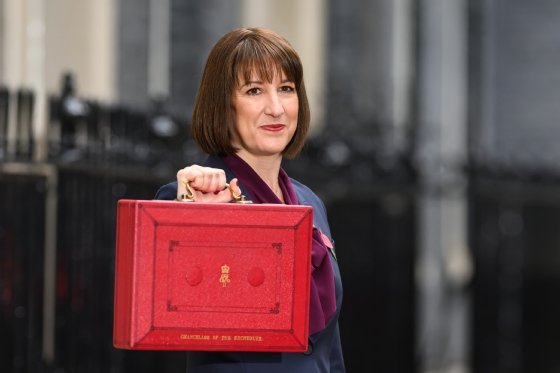Amid an Autumn Budget that raised taxes by £40bn while increasing capital investment by £100bn over five years, Chancellor of the Exchequer Rachel Reeves has largely continued existing policies that support the tech sector, while reiterating the importance of digital transformation in improving public sector efficiency. .
She also offered what will hopefully be a boost for victims of the Post office scandal by confirming an increase in compensation funding to £1.8bn, from the previous estimate of £1.2bn.
The Department for Science, Innovation and Technology (DSIT), which is responsible for both delivering key tech policies and digitally overhauling Whitehall, will see a 6.5% average increase in its spending over three years. Its current budget of £12.7bn will grow to £15.1bn in the 2025/26 financial year.
The Budget set a 2% efficiency improvement target for government departments, which Reeves said would depend heavily on improvements in the use of technology. She added that the 2025 Spending Review will be “mission-led, reform-focused and technology-enabled”.
“Today we are setting a 2% productivity, efficiency and savings target for all departments to meet next year by using technology more effectively and joining up services across government,” said Reeves, in her Budget speech to the House of Commons.
The government is working on a “strategic plan” to make the civil service more productive and efficient through “improving skills and harnessing digital technology to drive better outcomes for public services”, according to the budget documentation.
DSIT will invest £80m to transform corporate functions across government, such as HR and finance, as part of the government's shared services strategy.
A Digital Transformation Roadmap for HM Revenue & Customs will be published in spring 2025 to make the department a “digital-first organisation”.
And as part of NHS's previously announced 10-year health planthe government will invest more than £2bn in technology and digital to deliver NHS productivity improvements, free up staff time, ensure all trusts have electronic patient records, improve cyber security and enhance the NHS App.
Barriers to adoption
Reeves also announced a review of the barriers businesses face in adopting new technologies. Experts have long cited a lack of digital transformation among small and medium-sized enterprises (SMEs) as one of the major contributory factors to the UK's internationally low rates of productivity.
For example, the government cited the World Intellectual Property Organization 2024 global innovation index, where the UK ranked fifth out of 133 countries but only 31st in knowledge absorption.
Reeves said, “The UK lags behind every other G7 country when it comes to business investment as a share of our economy. That matters. It means the UK has fallen behind in the race for new jobs, new industries, and new technology.”
The review, led by chief scientific adviser Angela McLean and national technology adviser Dave Smith, will provide practical recommendations on how the government can work with businesses to address these obstacles, feeding into the industrial strategy.
The Department for Business and Trade will also soon announce details of a £4m package to encourage tech adoption for SMEs, and funding for the Made Smarter Adoption program will double to £16m in 2025-26 to help more small manufacturing businesses to adopt advanced digital. technologies. A further £37m will aim to help firms integrate digital technologies into the manufacturing process.
The SME Digital Adoption Taskforce will be extended and will produce an interim report early in 2025 with recommendations to enhance SME adoption of technology.
industrial strategy
The digital and technologies sector is one of the growth industries identified in the government's Industrial Strategy greenpaper, and as part of that, the budget announced £500m in 2025-26 to deliver Project Gigabit and the Shared Rural Network to drive the roll-out of digital infrastructure to underserved parts of the UK, aiming to hit a pre-existing target of full gigabit broadband coverage by 2030.
The budget statement said the government would protect levels of research and development (R&D) investment, with £20.4bn allocated in 2025-26. The government will set 10-year budgets for key R&D activities to “create a stable environment for productive long-term partnerships with industry”.

The government said it will deliver at least £25m in 2025-26 to launch a multi-year R&D Missions Program that aims to “solve targeted problems that will crowd in private and third sector investment to accelerate delivery of each mission”.
The government will also shortly publish an Artificial Intelligence Opportunities Action Plan, with a roadmap to “capture the opportunities of AI to enhance growth and productivity and better deliver services for the public”.
Julian David, CEO of tech sector trade body TechUK, warned that tax rises in the Budget will have an impact, but otherwise welcomed the technology policies announced by Reeves.
“The chancellor has taken on board a number of asks from the technology business community. Improving digital adoption in public services and SMEs are particularly important steps for the growth of the UK,” he said.
“To help businesses have the confidence to invest against this background of increased costs, the government must act fast and bring forward its plans for AI opportunities and the detail of the Industrial Strategy.”
Many in the tech startup sector had been concerned that rumored increases in capital gains tax and other measures might discourage investment, but Dom Hallas, executive director of the Startup Coalition, said that, while the budget will be hard for founders seeing taxes on their businesses. rise, the announcements were balanced.
“We appreciate that the government has listened to ensure that entrepreneurs' biggest fears have not materialized and some balance has been struck, including maintaining all-important R&D investment,” he said.
In a statement to accompany the budget, the government said: “As a mission-led government, the chancellor has today made clear the difficult choices this government will make to rebuild the country. This budget takes the difficult decisions on tax, spending and welfare to restore economic and fiscal stability, so that the government can invest in the country's future and achieve its mission for growth.”


